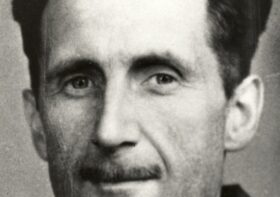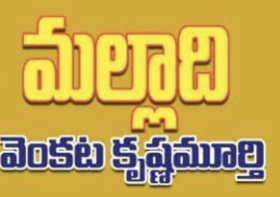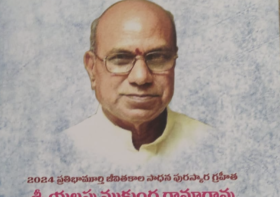Interview with Project Gutenberg’s Hart and Newby
పుస్తకాలంటే ఆసక్తి ఉండీ, కంప్యూటర్ వాడకం అలవాటు ఉన్నవారు ఎవరికైనా, ప్రాజెక్ట్ గూటెన్బెర్గ్ పేరు తెలియకుండా ఉండే అవకాశం లేదు. 1971లో విద్యార్థిగా మైకేల్ హర్ట్ మొదలుపెట్టిన – ’ఈబుక్’ ఉద్యమం, ఇప్పుడు గూటెన్బర్గ్ ప్రాజెక్టు రూపంలో దాదాపు ముప్పై వేల ఆంగ్ల పుస్తకాలను ఉచితంగా డౌన్లోడ్ చేసుకోడానికి సౌలభ్యం కలిగిస్తోంది. అంతే కాక, ఇతర భాషల గూటెన్బెర్గ్ ప్రాజెక్టులకి కూడా స్ఫూర్తిని కలిగిస్తోంది. ప్రపంచంలోని తొలి ఈబుక్ రూపొందించిన ఘనతతోపాటు, ప్రపంచంలోని అతి పురాతన డిజిటల్ లైబ్రరీని మొదలుపెట్టిన ఘనత కూడా – మైకేల్ హార్ట్, అతని టీంకే దక్కుతుంది.
1989వరకు పుస్తకాలని చేత్తో టైపు కొట్టి ఈ-వర్షన్లు తయారు చేసేవారని చదివితే, అప్పట్లో ఉన్న కొద్దిమంది గూటెన్బర్గ్ వాలంటీర్లకు ఎన్ని నమస్కారాలు పెట్టాలో!! తరువాత్తరువాత ఓసీఆర్, స్కానింగ్ సాఫ్ట్వేర్లు మంచి అభివృద్ధి సాధించాక, పూర్తిగా చేత్తో టైపు కొట్టాల్సిన అవసరం తగ్గింది. ఇప్పటికీ, వీరికి సహకరించే ఫ్రూఫ్రీడర్ల గుంపు ఓపికకి జోహార్లు. ఇటీవలి కాలంలో వారి గురించి చదువుతూ ఉంటే, వారిని పుస్తకం.నెట్ ద్వారా మరోసారి పరిచయం చేయాలనిపించింది. ఇలాంటిది ఒకటి తెలుగులో రూపొందడానికి ఎన్నాళ్ళు పడుతుందో కానీ, రూపొందడానికి మాత్రం, వీరు తప్పక సహకరిస్తారని, వీరి చరిత్రను చూస్తే ఇట్టే అర్థమౌతుంది. వీరితో కొన్ని నెల్ల క్రితం జరిగిన ఈమెయిల్ సంభాషణలో కూడా ఎవరన్నా తెలుగు గూటెన్బెర్గ్ మొదలుపెడితే సహకరించడానికి సంసిద్ధత వ్యక్తం చేశారు. అయితే, కాపీరైట్ల విషయంలో మహ జాగ్రత్తగా ఉంటారు సుమా!
మొదట వీరిని ఇంటర్వ్యూ కోసం అడిగినప్పుడు జవాబు ఆశించలేదు. కానీ, వీరు జవాబిచ్చి, అంగీకరించడమే కాక, ఓపిగ్గా మా ప్రశ్నలకి జవాబులు కూడా ఇచ్చారు. అందుకు వీరికి ఎన్నిసార్లు ధన్యవాదాలు చెప్పుకున్నా సరిపోదు.
We thank Michael Hart and Greg Newby for their patience and co-operation during the interview!
-Sowmya, Purnima.
వీరితో జరిపిన ఈమెయిల్ ఇంటర్వ్యూ ఇదిగో: (ఇంగ్లీషులో జరిగిన ఇంటర్వ్యూని అలాగే పెడుతున్నాము.)
How did you (@Mike) get an idea to publicize ebooks? What made you believe that people will accept it soon – as early as in 1971?
The story people ask for the most: What happened the night of July 4, 1971, when Project Gutenberg’s first title was created and put on the Internet in the morning.
[Technically, one may put the date as July 5, it took all night.]
We then go through the 1970’s, the U.S. bicentennial, including a phase when Project Gutenberg was really nothing more than History of Democary documents, as could be seen on the walls of any mall, school, etc., during that period.
Then into the 1980’s and “The Computer Revolution,” with PC’s hot on the trail of replacing the “big iron” mainframes, not so long, just 33 years, since Thomas J. Watson, President of IBM, said the world would never need more than a handful of computers in 1948.
Just long enough to be born, get through your postdoc studies and try to find a real job. . . .
OK, technically it was night.
I wonder just how many of “The Computer Revolution” moments quite literally took place in the middle of the night rather than in an entirely daylight environment?
It’s not really a useless question to consider as a gread deal of The Computer Revolution took place at night, in “spare time.”
Here is the story, as best as I can remember, with some comments.
It’s just a pretty plain description of what happened that night, I haven’t tried to edit it up or down to make it more interesting as I feel that the invention of eBooks makes it interesting enuf.
July 4, 1971
It was hot, but I went to the fireworks anyway, walking to the UI Memorial Stadium with tens of thousands of other people as we had done year after year for decades, but which is no longer done, as the UI MBA’s have taken over and decided that the good will to an ordinary surrounding community is not worth the cash outlay to do the fireworks there, even if the people donate enough for payment for all the fireworks. It’s a long and political story, so I may not ever get into to in depth, as I hate politics so much; hating politics has more to do with starting Project Gutenberg than your current thinking might imagine.
The fireworks were great as usual, finishing with “Niagara Falls” covering the 50 yard line with a literal waterfall of white fire.
Even after 10PM it was still hot even though dispersing crowds is supposed to reduce the temperature.
It was so hot I didn’t want to walk all the way back to my house, a sabbatical house a mile or two off campus, so I meandered along toward The Materials Research Lab, turning first left then right, thus crossing just about every street on campus on the way.
I finally got to the street the lab was on just at the right time and place, and was lucky enough to find the tiny campus IGA store still open and happy to sell me some snack staples to get me into and through the night and back to classes the next morning.
Try doing THAT on a major holiday these days!!!
I saved part of a tree by using my ubiquitous nylon backpack, not the kind you buy today for $30, but a much better kind except for not so many pockets, but made out of REAL nylon that lasts for an eternity of ridiculously hard use. They stuffed my purchasing in there, and, without my knowledge, a faux parchment copy of the US Declaration of Independence. Courtesy of Philip Morris tobacco– the tobacco companies were still trying to lie there way out of a whole forest of tobacco disease, etc., lobbying like hell. But I don’t have time to go into that here. However, as you will see a bit later, I do owe them something for it, just as I owe a lot to those people who sent me that draft notice on my 19th birthday.
Project Gutenberg might well have not happened without both.
I was back in school via “The G.I. Bill” and that gave me freedom from the parents at school to do wild and crazy things instead of trying to be a good student.
The funny things there are that my parents tried to make me free, but didn’t realize that it’s really really hard to do that.
I was much freer going on my own dime. . . .
So free that I was going to stay up all night at the computer and not go home, just so I could be in the air-conditioning.
1971. . .not a lot of places I could go with air-conditioning.
I got to to the lab, but the building was locked. State holiday.
Oh, there were people inside, but none who approved of me being a totally unofficial computer geek, so even when I knocked on their windows they wouldn’t let me in.
Yes, “The Have” and “The Have Nots” were still doing it in 1971.
They thought it was fun and funny to keep me out, and many a time I had to pretend I was coming out or just walking by so the doors would not be intentionally slammed in my face to keep me out.
I loved it when I was going out after hours, and they were coming up to the door with their keys in their hands. . .I would go well out of my way to be extremely polite to them in face of hostility that was open and arrogant on their part. Some of them should be noted to actually refuse to enter while I was holding the door to let them in, instead waiting for it to close so they could use an arrogant key that I did not have, as I was NOT one of THEM.
Arrogant. . . . If only they had seen my transcripts. . . .
Yes, I was rebellious. Always have been. “Question Authority!”
I grew up in a house that had hot and cold running professors and all sorts of other people, all the way to mountain men, merchant- marine men, artists, dentists, bookstore owners, etc. I will add that when I grew up I could stop at any bookstore in Tacoma to do a little shopping, without any money. I could just take books to show my parents, and if they approved, pay on the weekends.
My history with books goes way back, and also with electronics.
The first thing I ever bought with my own money was a large book, over a thousand pages of what is still the best I ever read:
“Adventures in Space and Time,” Edited by Healy and McComas.
It was a dime, at the first garage sale I ever went to.
I was instantly hooked on garage sales!
The first thing Dad bought with his saved Army money after Korea, a hi-fi, which introduced me to electronics.
I mention these two because without a lifelong history with books and electronics it would not have been nearly as likely for me to have invented electronic books. Yes, it was a huge leap complete with the lightbulb going off over my head, but it was possible or I couldn’t have done it.
That’s what people always ask:
“How did you combine books with computers?”
I tell them I was the right person at the right time and I was in
the right place with the right background.
In short. . .it takes a lot of luck. . .even if you are a genius.
I should add that both of my parents were geniuses, though I will honestly tell you that they did NOT believe in genius at all.
My Mom earned three degrees by her 17th birthday after growing up going to school in a one room schoolhouse.
My Dad got straight A’s on the G.I. Bill, just like I did.
But, just for the record, I did the whole four years in two.
Back to getting into the computer lab. . . .
OK, so they wouldn’t let me in. Still, they had to come out.
I decided it was very comfortable lying there on the grasss, next to the building, cops and security weren’t big in those days, and I just waited for someone to open the door. However, I was slow, and I didn’t get there before it closed, so I asked to be let in, explaining that I wasn’t officially supposed to be there.
The man said he knew who I was and that he would let me in. Even refusing my offer to bring someone down from the computer to tell him it was OK.
Funny how some of the people in The Materials Research Lab should like having me around while others were rabid out keeping me out.
So I got in, and the fateful events of the night of July 4, 1971, started to unfold in earnest.
My brother’s best friend was the night operator, another stroke I have to credit my luck and I was welcome any time I could get in.
That particular day carried yet another stroke of luck, as bosses go his was nice enough, but didn’t like me playing with computers when I was logged in as the operator with all those privileges.
So, believe it or not, for months he had been lobbying HIS bosses to give me my own account, so it shouldn’t be so dangerous if I’d do something really stupid, like delete all the files.
Anyway, the first things I hear when I walk in is that my account is ready and I have to learn a new password. I never really did, so funny, so I pretty much kept logging in as an operator, but it did occur to me to bill my work to my real account so it looked a lot like I was doing what I was supposed to be doing. Not that I was supposed to be doing anything in particular. They thought my learning to use the computer was a “good thing” and encouraged me to do so. . .computer operators were hard to come by back then.
So, once we got my new account set up, I had to think of what the heck I would do with it. They had given me a huge amount of what they called “computer money” to run it with: a hundred thousand, or a hundred million, I think now it was a hundred thousad, and I was so knocked out by it that I thought I should do something via that account that would repay all of their kind investment.
I was too tired to think clearly enough to create such a project, and I wanted this project to be something that would still be an important element of the new Internet a decade later, and perhaps even a century later. I wanted something permanent in a world of computers where hardly anything was permanent.
I also wanted it to be something that would improve all the lives of everyone in the future, not just computer geeks.
I also wanted it to be something not useable as a weapon.
I was tired of all science and math being weaponized.
I hadn’t a clue how to achieve any or all of these lofty goals.
So I took a break.
I figured I’d better get rested, get my blood sugar up and going, and then perhaps I would be able to think up something worthy.
I got out my backpack and spilled the contents out on the floor– I was looking for my brownie mix for energy, but what hit my eyes first was the silly faux parchment US Declaration of Independence the grocery clerk had tossed in with my other stuff.
The light went on over my head. . . .
That was it. . . .
I would type in The Declaration of Independence and it would stay on the Internet forever, and millions of people would use it from now until the end of history.
Whew!!!
It made my head spin. . .I literally got dizzy thinking about it.
I looked up at the clock.
It was 1:41AM, so technically it was July 5.




Sowmya
I started re-reading the interview today, when we just recently saw 5th Telugu book on Project Gutenberg! I was smiling when I saw those lines – “ఇలాంటిది ఒకటి తెలుగులో రూపొందడానికి ఎన్నాళ్ళు పడుతుందో కానీ” 🙂
gksraja
‘పుస్తకాలంటే ఆసక్తి ఉండీ, కంప్యూటర్ వాడకం అలవాటు ఉన్నవారు ఎవరికైనా, ప్రాజెక్ట్ గుటెన్బర్గ్ పేరు తెలియకుండా ఉండే అవకాశం లేదు’ — గుటెన్బర్గ్ పేరు తెలుసు కానీ ఇంత వివరం తెలియదు. మంచి ఇంటర్వ్యూ — డానికి ధీటైన ముందు మాట… ధన్యవాదాలు సౌమ్యగారు!
రాజా.
On Michael Hart « sowmyawrites ….
[…] is one of the best we did in the past 2.5 years. (The text of the e-mail interview can be accessed here, with an intro in […]
పుస్తకం » Blog Archive » Project Gutenberg founder, Michael S. Hart passed away!
[…] Michael talking to pustakam a while ago. […]
పుస్తకం.నెట్ కు రెండేళ్ళోచ్! « sowmyawrites ….
[…] -మంచి పుస్తకం, కొత్తపల్లి, ఏవీకేఎఫ్, గూటెంబర్గ్ – వీరితో వచ్చిన […]
leo
@సౌమ్య: నా బ్లాగు చూస్తే అర్థమవుతుంది. ఒకటి రెండు వాక్యాలను మించి రాయలేను అందుకే 🙂
leo
I once volunteered to be a proof reader for one of the Gutenberg projects but pretty soon gave up. Hats off to the people who keep at it and continue to provide free ebooks. Many of the classics are available from Project Gutenberg and maybe the pustakam.net team can consider introducing one every week or month. I recently read Anna Karenina(http://www.gutenberg.org/etext/1399), Wind in the Willows(http://www.gutenberg.org/etext/289) and Siddartha(http://www.gutenberg.org/etext/2500) from the Gutenberg archive. If you have an Android smart phone give the Aldiko app a try. You can download the epub format of the ebook from Project Gutenberg and import it into Aldiko and read it on the go.
Count me in for the Project Gutenberg in Telugu project. I once saw this post about Tesseract OCR don’t know if it is of any help – http://andam.blogspot.com/2009/08/tesseract-ocr-getting-started.html
Thanks and keep doing the good work pustakam.net team.
సౌమ్య
@Leo: “the pustakam.net team can consider introducing one every week or month”
-Why don’t you be the one to begin it, and drive others to repeat it? 😉
budugoy
Just 3 comments?? I read this article while travelling and hoped this would become a starting point to some nice proposal by the time i came back. optimistic me 🙂
తెలుగులో ఇపుడపుడే OCR technology వస్తుందన్న ఆశైతే నాకు లేదు. అప్పట్లోగా గూటెన్బెర్గ్ స్థాయిలో ప్రాజెక్టులు చేయాలంటే స్కానింగే దారి.
two arguments against scanning/pdfs are 1) higher bandwidth for downloads 2) lack of flexibility in presentation(readability). First one might wane over a period of time but second one is a genuine objection.
ప్రస్తుతం నెట్లో ఉన్న ఆంధ్రభారతి/ఈమాట ఆర్కైవ్స్/ఆంధ్రమహాభారతము లాంటి scattered efforts టైప్ చేసినవే. టైపింగుతో బోలెడు సమయంతో పాటు ప్రూఫ్ రీడింగులాంటి సమస్యలు కూడా ఉత్పన్నమవుతాయి. but readability, portability(say we want to upload this to ipad/kindle in future) make this route worthy inspite of heavy efforts involved. Any comments/arguments?
So Whats the starting point for such a project?
1) a wishlist for books, (ofcourse due care should be taken abt copyrights)
2) a sign-up list for volunteers.
what say pustakam.net?
PS: btw, I will take that wager on the next big thing abt translation 🙂
Sreenivas Paruchuri
> గటెన్బర్గ్
మరీ అంత ఘోరంగా పేర్లని ఖూనీ చేయడమా! 🙂 Umm! గూటెన్-బెర్గ్ అని పలకాలి.
— Sreenivas
సౌమ్య
సవరించాను – ధన్యవాదాలు.
ఆమధ్య మెహెర్ గారు ఇక్కడే అన్నట్లు : చదవడమే కానీ, పలకడం అలవాటు లేదు కదండీ 🙂
Malathi
Interesting. The intro in Telugu is good. The interview at the beginning was a little hard to follow, for me anyway. The latter part was a better read. Oh, I almost forgot to mention.
పుస్తకాలంటే ఆసక్తి ఉండీ, కంప్యూటర్ వాడకం అలవాటు ఉన్నవారు ఎవరికైనా, ప్రాజెక్ట్ గటెన్బర్గ్ పేరు తెలియకుండా ఉండే అవకాశం లేదు – That is me! I learned about this only here and now. :))